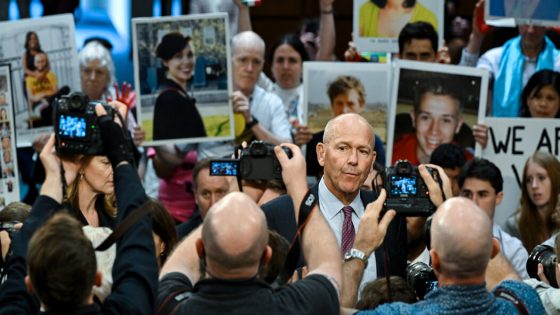Shortly after Boeing’s chief executive, Dave Calhoun, took his seat, families who lost relatives in the 2018 and 2019 crashes of the company’s 737 Max 8 planes called out to him, demanding that he turn around and acknowledge them and the photos of their loved ones.
Among those behind Mr. Calhoun were the parents and brother of Samya Rose Stumo, a 24-year-old who was killed in the 2019 Ethiopian Airlines accident and a grandniece of Ralph Nader, the consumer advocate and former presidential candidate. Nearby sat the family of John Barnett, the former Boeing engineer and whistle-blower who died by suicide earlier this year in the midst of a Justice Department criminal investigation into the company. Others held photos of their loved ones lost in the crashes.
“I would like to apologize, on behalf of all of our Boeing associates spread throughout the world, past and present, for your losses,” Mr. Calhoun said while facing the families. “And I acknowledge and apologize for the grief that we have caused.”
The hearing was Mr. Calhoun’s first appearance before Congress since a January incident in which the door plug of a 737 Max 9 plane ripped off during an Alaska Airlines flight at an elevation of about 16,000 feet near Portland, Ore.
Mr. Calhoun, who plans to step down at the end of the year, took over as chief executive in 2019 after two fatal crashes of a smaller version of the jet, the 737 Max 8. Those crashes, in which 346 people died, led to a 20-month global ban on the plane.
Members of the Senate investigative panel questioned Mr. Calhoun about reports of the company retaliating against whistle-blowers who raised safety and quality concerns, how parts made of questionable titanium made it into Boeing planes without detection and allegations of falsified inspection records involving the company’s 787 Dreamliner.
Senator Richard Blumenthal, a Democrat of Connecticut and chairman of the subcommittee holding the hearing, said Mr. Calhoun had assured lawmakers that he was the leader Boeing needed to turn the corner after the Max crashes in 2018 and 2019. Mr. Blumenthal said the company had appeared to be heading in the right direction until the January incident, which he said exposed shortcuts the company had been taking.
“This past January, the facade quite literally blew off the hollow shell that had been Boeing’s promises to the world,” Mr. Blumenthal said. “And once that chasm was exposed, we learned that there was virtually no bottom to the void that lay below.”
Senator Josh Hawley, a Republican of Missouri, criticized Mr. Calhoun and said he had failed to foster a culture of transparency and safety at Boeing, noting how the company has come under intense federal scrutiny under his leadership. Mr. Hawley told Mr. Calhoun that he is not meeting the standards needed to justify his vast annual salary.
“You are under investigation for falsifying 787 inspection records,” Mr. Hawley said. “Boeing is under criminal investigation for the Alaska Airlines flight. You were investigated by D.O.J. for criminal conspiracy to defraud the F.A.A. — this is all under your tenure. This doesn’t sound like transparency to me.”
In response to tough initial questioning from Mr. Blumenthal, Mr. Calhoun accepted responsibility for the crashes during his testimony.
“I accept that MCAS and Boeing are responsible for those crashes,” Mr. Calhoun said. “We are responsible.” MCAS stands for Maneuvering Characteristics Augmentation System, a flight-stabilizing feature that caused the 2018 and 2019 crashes.
In its report, the subcommittee cited several whistle-blowers, including one who first publicly shared his concerns with The New York Times. The whistle-blowers accused the company of failing to track unapproved parts and, in some cases, even allowing those components onto the production line.
One whistle-blower, Sam Mohawk, who works as a quality inspector in the factory where Boeing assembles the Max, told the committee that the company had lost track of hundreds of unapproved Max parts and “intentionally hid” improperly stored components from the F.A.A. during an inspection last summer.
The subcommittee also said that Boeing had engaged in what it described as a “yearslong effort” to cut quality inspections.
“We received this document late Monday evening and are reviewing the claims,” Boeing said in a statement. “We continuously encourage employees to report all concerns as our priority is to ensure the safety of our airplanes and the flying public.”
On May 30, Boeing outlined a required plan to the Federal Aviation Administration on how it would address safety and quality concerns that emerged after the door plug incident. Last week, the F.A.A. and European Union Aviation Safety Agency said they were investigating how titanium with falsified documentation made it onto Boeing and Airbus planes.
Boeing has said that it made several changes in the months since the panel blowout, including expanding training for new hires, ordering more tools and equipment, helping managers spend less time in meetings and more time on the factory floor, and increasing inspections both at Boeing and at a top supplier.
The company also said that it had re-emphasized its commitment to quality in more than 20 meetings at sites around the world in which work was paused and employees were encouraged to speak up about concerns and share ideas on how to improve quality. Tens of thousands of workers participated in those meetings, providing thousands of suggestions, the company said.
In his prepared remarks, Mr. Calhoun said that the company was taking steps to improve safety and quality. He apologized to the families of the victims of the Max crashes and said that the company regretted how the January incident affected the passengers and Alaska Airlines.
“Our airplanes have carried the equivalent of more than double the population of the planet,” Mr. Calhoun said in his remarks. “Getting this right is critical for our company, for the customers who fly our planes every day and for our country.”
In their concluding exchange, Mr. Blumenthal asked Mr. Calhoun one more time for his word that he would research the answers he did not have on Tuesday and report back to the committee. Mr. Calhoun said he would.
“We all on this panel want Boeing to do well and succeed,” Mr. Blumenthal said. “But that requires a course correction. That requires a correction of that broken safety culture.”
Source Agencies




